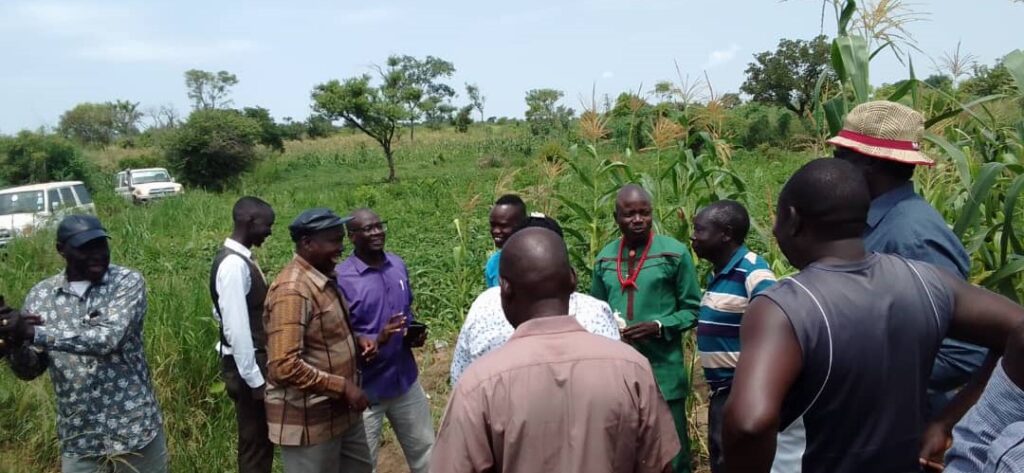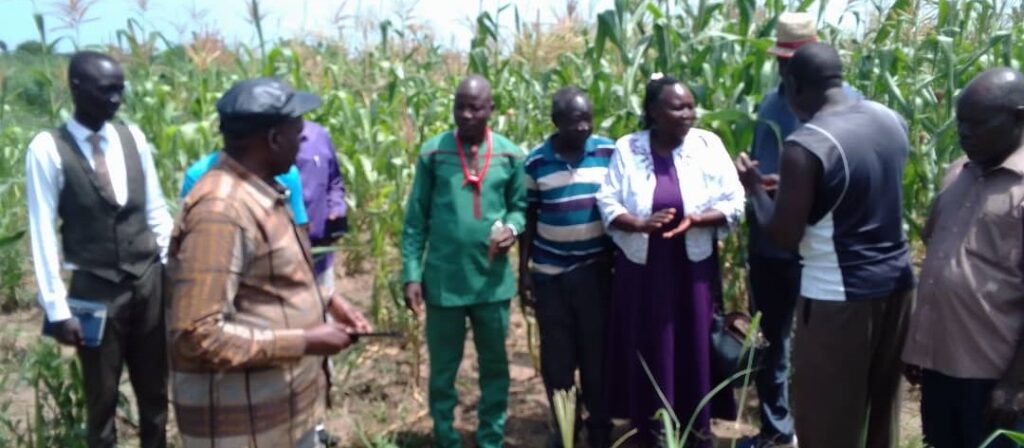A high-level delegation from the Agricultural Bank of South Sudan recently conducted a two-day visit to assess the challenges facing farmers in Eastern Equatoria State. The visit aimed at providing loans and farm tools to progressive farmers in the region.
The six-member delegation, led by Prof. Dr. Michael Roberto Kenyi, focused on engaging with farmers in Torit, Magwi, and Budi counties. They assessed farming activities and discussed issues affecting farm productivity with the goal of offering support.
When asked by Radio Tamazuj about the specifics of the loans and tools, the delegation did not disclose the exact amounts or the number of farms to be assisted, stating that the allocated budget for this initiative is not yet fixed.
Prof. Dr. Michael revealed that the team plans to extend their assessment to Central and Western Equatoria states to interact with cooperative groups, progressive farmers, and agricultural investors.
“This visit is part of a broader initiative across all Equatoria States. Our goal is to understand the challenges faced by farmers and agricultural investors in these regions and to provide financial and material support to enhance food production,” he explained.
In addition to his legal career, Ajo Noel Julius is the Executive Director of Igele Farm, which spans about 1,000 hectares in Torit. He started the farm using his earnings as a lawyer, without any support from the government or banks.
He holds a Master of Laws (LLM) in Banking, Corporate Finance, and Security Law from Harvard Law School in the United States. He is a former Legal Manager at KCB South Sudan and played a significant role in representing the former political detainees, securing their release. Ajo is the Managing Partner at AJO & Co. Advocates, a leading full-service law firm in South Sudan founded in 2013 that specializes in various legal fields, including corporate finance, international law, human rights, mergers and acquisitions, energy, and dispute resolution.

Ajo has called on both national and state governments, as well as the Agricultural Bank of South Sudan, to provide loans and invest in building farmers’ capacities to combat food and human insecurity across the country.
“We are trying to fight food insecurity and, by extension, human insecurity. We want to prevent our people from becoming rebels by helping them build their lives through farming and wealth creation. Our people have suffered for too long, and I aim to break this cycle of violence. I started this farm with zero support from the government and no loans from any bank. Agriculture is expensive, and there are gaps due to our lack of expertise. With financial support, we can hire experts to manage these farms. I encourage young people to return to their villages and start something meaningful,” Ajo explained.
Ochan Walter, Executive Director of Lobele Farm in Magwi, emphasized the impact of farming on improving his children’s education. He noted that many farmers in Magwi rely on traditional farming methods, which limit mass production for both consumption and commercial purposes.
“We started farming in 2005 and quickly realized its value. Initially, we worked with just two hectares. Despite my lack of formal education, I wanted my children to receive an education. Today, my farm is progressing because my son, who graduated in agriculture, now manages it. Although we bought ox-ploughs, they are insufficient without hiring a tractor. Since we began farming, we have received no support. The visit from the Agricultural Bank team is a ray of hope. We need to combat hunger and require support for farmers. Poor roads are also a significant problem. If Juba didn’t receive food from Uganda, it would be a crisis. We depend on your support. You have tractors in Juba; why not send them here to help farmers in Magwi?” Ochan explained.
Ochola Bosco, the Eastern Equatoria State Minister of Agriculture, praised President Salva Kiir and his administration for their efforts in combating poverty nationwide. He emphasized the state government’s commitment to supporting farmers with skills and tools to increase production.
“We appreciate President Salva Kiir Mayardit and First Vice President Dr. Riek Machar for initiating and promoting agriculture. This initiative is crucial for the citizens of Eastern Equatoria State to produce mass food, thereby eradicating poverty and hunger in our community. As a ministry, we will work closely with you to ensure your objectives for improved production are fully supported. Any initiatives you request from us will be met with full cooperation,” Ochola stated.
Hon. James Gok Ruai, a board member of the Agricultural Bank of South Sudan, acknowledged that reliance on oil revenue has contributed to poverty in South Sudan. He encouraged citizens to engage in farming, assuring them of the bank’s support.
“President Kiir has declared that everyone should turn to farming because oil money has misled us, and we might find it depleted at any time. However, our land will never dry up. The Agricultural Bank of South Sudan will support you with whatever resources we have to boost your efforts. Let us use oil revenues to enhance agriculture, making farming the engine of our economic growth,” Ruai stated.




